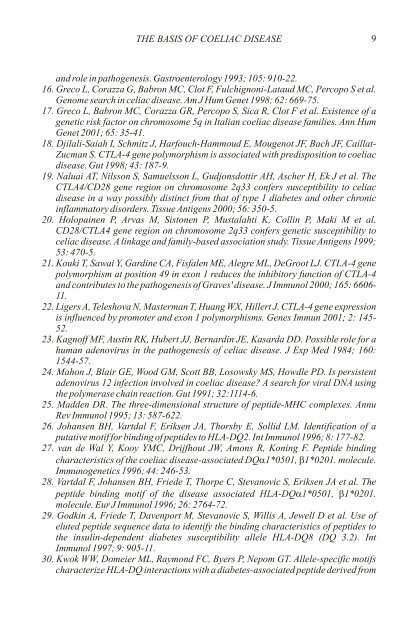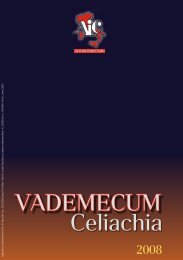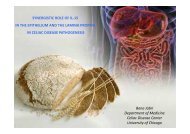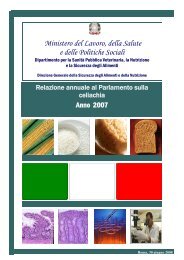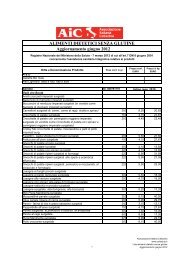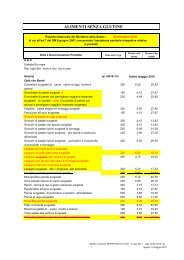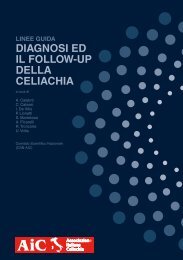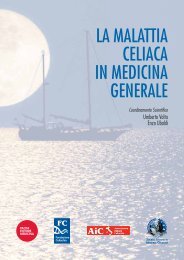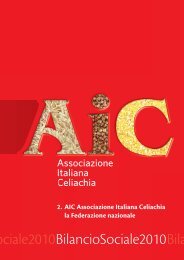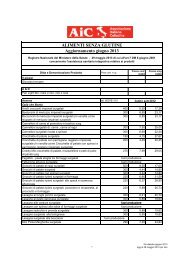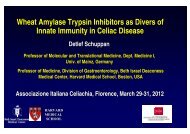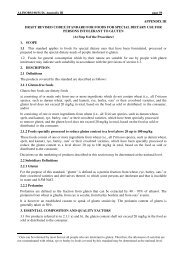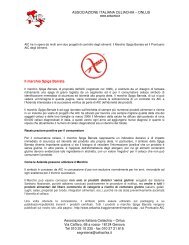primary prevention of coeliac disease - Associazione Italiana ...
primary prevention of coeliac disease - Associazione Italiana ...
primary prevention of coeliac disease - Associazione Italiana ...
You also want an ePaper? Increase the reach of your titles
YUMPU automatically turns print PDFs into web optimized ePapers that Google loves.
THE BASIS OF COELIAC DISEASE<br />
9<br />
and role in pathogenesis. Gastroenterology 1993; 105: 910-22.<br />
16. Greco L, Corazza G, Babron MC, Clot F, Fulchignoni-Lataud MC, Percopo S et al.<br />
Genome search in celiac <strong>disease</strong>. Am J Hum Genet 1998; 62: 669-75.<br />
17. Greco L, Babron MC, Corazza GR, Percopo S, Sica R, Clot F et al. Existence <strong>of</strong> a<br />
genetic risk factor on chromosome 5q in Italian <strong>coeliac</strong> <strong>disease</strong> families. Ann Hum<br />
Genet 2001; 65: 35-41.<br />
18. Djilali-Saiah I, Schmitz J, Harfouch-Hammoud E, Mougenot JF, Bach JF, Caillat-<br />
Zucman S. CTLA-4 gene polymorphism is associated with predisposition to <strong>coeliac</strong><br />
<strong>disease</strong>. Gut 1998; 43: 187-9.<br />
19. Naluai AT, Nilsson S, Samuelsson L, Gudjonsdottir AH, Ascher H, Ek J et al. The<br />
CTLA4/CD28 gene region on chromosome 2q33 confers susceptibility to celiac<br />
<strong>disease</strong> in a way possibly distinct from that <strong>of</strong> type 1 diabetes and other chronic<br />
inflammatory disorders. Tissue Antigens 2000; 56: 350-5.<br />
20. Holopainen P, Arvas M, Sistonen P, Mustalahti K, Collin P, Maki M et al.<br />
CD28/CTLA4 gene region on chromosome 2q33 confers genetic susceptibility to<br />
celiac <strong>disease</strong>. A linkage and family-based association study. Tissue Antigens 1999;<br />
53: 470-5.<br />
21. Kouki T, Sawai Y, Gardine CA, Fisfalen ME, Alegre ML, DeGroot LJ. CTLA-4 gene<br />
polymorphism at position 49 in exon 1 reduces the inhibitory function <strong>of</strong> CTLA-4<br />
and contributes to the pathogenesis <strong>of</strong> Graves' <strong>disease</strong>. J Immunol 2000; 165: 6606-<br />
11.<br />
22. Ligers A, Teleshova N, Masterman T, Huang WX, Hillert J. CTLA-4 gene expression<br />
is influenced by promoter and exon 1 polymorphisms. Genes Immun 2001; 2: 145-<br />
52.<br />
23. Kagn<strong>of</strong>f MF, Austin RK, Hubert JJ, Bernardin JE, Kasarda DD. Possible role for a<br />
human adenovirus in the pathogenesis <strong>of</strong> celiac <strong>disease</strong>. J Exp Med 1984; 160:<br />
1544-57.<br />
24. Mahon J, Blair GE, Wood GM, Scott BB, Losowsky MS, Howdle PD. Is persistent<br />
adenovirus 12 infection involved in <strong>coeliac</strong> <strong>disease</strong>? A search for viral DNA using<br />
the polymerase chain reaction. Gut 1991; 32:1114-6.<br />
25. Madden DR. The three-dimensional structure <strong>of</strong> peptide-MHC complexes. Annu<br />
Rev Immunol 1995; 13: 587-622.<br />
26. Johansen BH, Vartdal F, Eriksen JA, Thorsby E, Sollid LM. Identification <strong>of</strong> a<br />
putative motif for binding <strong>of</strong> peptides to HLA-DQ2. Int Immunol 1996; 8: 177-82.<br />
27. van de Wal Y, Kooy YMC, Drijfhout JW, Amons R, Koning F. Peptide binding<br />
characteristics <strong>of</strong> the <strong>coeliac</strong> <strong>disease</strong>-associated DQa1*0501, b1*0201. molecule.<br />
Immunogenetics 1996; 44: 246-53.<br />
28. Vartdal F, Johansen BH, Friede T, Thorpe C, Stevanovic S, Eriksen JA et al. The<br />
peptide binding motif <strong>of</strong> the <strong>disease</strong> associated HLA-DQa1*0501, b1*0201.<br />
molecule. Eur J Immunol 1996; 26: 2764-72.<br />
29. Godkin A, Friede T, Davenport M, Stevanovic S, Willis A, Jewell D et al. Use <strong>of</strong><br />
eluted peptide sequence data to identify the binding characteristics <strong>of</strong> peptides to<br />
the insulin-dependent diabetes susceptibility allele HLA-DQ8 (DQ 3.2). Int<br />
Immunol 1997; 9: 905-11.<br />
30. Kwok WW, Domeier ML, Raymond FC, Byers P, Nepom GT. Allele-specific motifs<br />
characterize HLA-DQ interactions with a diabetes-associated peptide derived from


